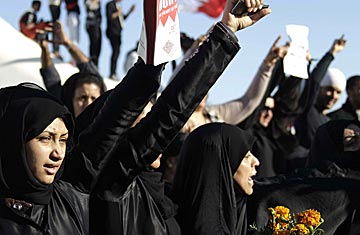
Bahraini anti-government protesters return to Pearl Square in Manama on February 19, 2011.
After being subjected to a violent crackdown on Thursday and Friday, pro reform protesters flooded back into Manama's Pearl Roundabout when Bahraini security forces withdrew from the area on Saturday afternoon. In a scene of jubilation familiar to those watching Egypt's Tahrir Square after President Hosni Mubarak stepped down, crowds danced and sang and waved the red and white flag of Bahrain. Even before the last police vehicle pulled away pro-reform protesters were streaming onto the grassy slope at the center of the roundabout. One man threw his white banner, upon which PEACEFUL was written in both English and Arabic, to the ground as he knelt down to kiss the earth.
But the security forces' sudden retreat, following two days of a violent and bloody crackdown that left four dead and scores injured, in addition to another six during earlier clashes, marked a joyful pause rather than a happy ending. In a brief appearance on State TV, Crown Prince Salman bin Hamad Al Khalifa, deputy supreme commander of the armed forces, appealed for calm and offered a political dialogue. "The sooner we return to calm, the sooner we can reach our goals," said the Prince, looking pale and drawn. "Citizens of Bahrain, let's work together with all political blocks to help return the security situation to normal so we can announce a day of mourning for those we've lost."
The announcement was met with cautious praise by some, and outraged condemnation by others. "We need to have dialogue in order to solve the problem," says Ali Sabah, an occupational therapist who works at a nearby hospital. "So many died, so we have to make sure that they did not die in vain. So if dialogue brings us our rights, then it is a good thing."
Sayed Mohammed, a 27-year-old auditor swathed in the Bahraini flag, wasn't so sure, and his doubt was a common refrain. "We are free now, but it could turn around anytime." He was still sweating from his sprint across the road to reach the monument. "I don't trust the government. For half a decade we waited for promises of reform to materialize. We are tired of waiting. We want change now."
As night fell and the frenzied victory chants calmed to song, other protesters arrived with tents and supplies, determined to stay the night in the square as they had earlier in the week just before Thursday's pre-dawn raid by security forces ended in a tear-gas and bullet ridden massacre, which one outspoken Bahraini journalist described as genocide in a press conference. To forestall another such attack, volunteers not only set up medical tents and food supply lines, they also organized a rotating system of sentries. Families sat under the palm trees fringing the roundabout to picnic, and young men set up their hubbly bubbly pipes. On the slope leading up to a nearby overpass, lit candles spelled out 'Peaceful' in Arabic; on another slope, 'Freedom' could be read.
The about face of the Royal family appears to have come in part from Western pressure, including a strongly worded conversation between King Hamad bin Isa Al Khalifa and US President Barak Obama on Friday night. Obama asked the king to hold those responsible for the violence accountable, and cautioned him that Bahrain must respect the "universal rights" of its people and embrace "meaningful reform."
In the Pearl Roundabout, protesters saw another incentive. An international auto race in Bahrain was canceled this weekend due to the unrest, and Formula One officials are now deciding whether or not to go forward with a season-opening event in Bahrain scheduled for March 13th. It would be a huge blow to Bahrain's economy and prestige. It's also a pet project of the Crown Prince, who has been deputized by his family to open dialogue with the opposition. "It was the prince's dream since he was a boy to have Formula One come to Bahrain, says Sabah. "And if this keeps going on, he will lose it."
Whatever the reason, even leaders of Bahrain's opposition parties, which represent the country's Shi'ite majority (and the bulk of protesters, who feel, with justification, that they are the victims of discrimination), have taken the offer of dialogue with a grain of salt. "This is a welcome turnaround," says M.P. Dr. Jasim Husain Ali, of the al Wafaq party. "We were on the brink of a calamity. But history doesn't support the theory that when we have dialogue, peace prevails. There have been many broken promises."
